19 Questions I Asked Kristian Brask Thomsen - Ambassador For The Best Restaurants In The World

If you ever thought how to host the best dinners in the world and secure a guest list that shimmers with the names of royals and stars, then Kristian Brask Thomsen is your man – ask him for his secrets!
An ambassador for the best restaurants and star chefs, a film producer, the head of Bon Vivant Communications, and host of the enchanting Dining Impossible, once a restaurateur himself, this Denmark- born charismatic entrepreneur literally knows it all.
I met Kristian in 2021 when he and Hrachya Aghajanyan hosted a series of dinners at Tsaghkunk Restaurant & Glkhatun prepared by an acclaimed chef and Noma co-founder Mads Refslund. But only now, while I am at Tbilisi Gastro Week, has an opportunity arisen to ask him about his impressions of Armenia, whether he has more plans for us, and how he became a host of the dinners that Forbes calls “the ultimate” and the VICE - “the wildest”? And, yes, I also should ask why he currently resides in Tbilisi…
On a sunny afternoon, I headed for Kristian’s office… “We are located just opposite an Armenian church, - his assistant Annie Eloiani explains. What a coincidence! “Black gates, second floor”, she says... I enter the office – stylish, modern and vibrant…
- Kristian, - I say after the greetings, - I still remember that dinner at Tsaghkunk – how intriguing and atmospheric it was. And due to the immense coverage by international press, that you invited, Armenia was shining globally! My question is – how does one continue to remain in the spotlight, not just appear as a one-off? Is it PR we must increase? Do we need to invite journalists more often?
-Yes, absolutely. But you really need to have a plan. Inviting journalists is great but not for just showing them around the usual places in Yerevan. You need to make journalists feel like they are Armenians, at least for the time they are staying there. I think one of the reasons we had such a huge success - eighteen articles in the biggest newspapers in Europe and in the US, including Forbes, plus a massive social appearance, was because we took some of the most influential writers in the world and made something truly special for them. We showed them Armenian heritage, arts, and music, wineries and cozy restaurants in the regions, and then we took them on the Wings of Tatev, stopped the cable midway above the gorge for a sparkling wine and a special treat prepared by Rafayel Kazumyan. After that we flew in helicopters from Tatev Monastery through the sunset all the way back to Yerevan. We just made it magical. And this inspired them to write even more that they intended to because now they had a DNA of Armenia under their skin. That press gave Armenia a return in PR with a value of millions of dollars and it was a great success - everybody was looking at you. I hope that your diplomats and representatives used that to effect afterwards.
-So, what do you have for us in 2024?
- We plan with Hrachya to bring Diego Muñoz - a celebrated Peruvian chef
and invite the international press again. It all depends on the situation in the country. I have also initiated a collaboration with a one-Michelin-star Portuguese chef to develop a new menu for Artak Harutyunan’s new restaurant. Further, I want to strengthen the links between you and Georgians. Three months ago, I took Tekuna Gachechiladze - the Queen of Georgian cuisine to Armenia. She travelled there for the first time in thirty-five years and was surprised by the quality and a general progressiveness of your cuisine. So, we plan a great collaboration between her and the Tsaghkunk restaurant.
-When you were in Armenia, did you have your favorites foodwise?
- I like very much how adventurously Arevik Martirosyan reinterprets classical Armenian flavors at Tsaghkunk. I like the way Rafael Kazumyan cooks – he really tries to do something different. Ayk Veyshtort is a chef to look at. The Mayriq restaurant is a good mix of Lebanese and Armenian kitchens. I like to be on the balcony of the Vostan, and to go to Dilijan’s Im Toon. On the traditional side I like having these great Armenian meat feasts with lots of food and good wines. Allow me to congratulate you on your booming wine industry. It’s quite overlooked internationally but offers very well produced wines.
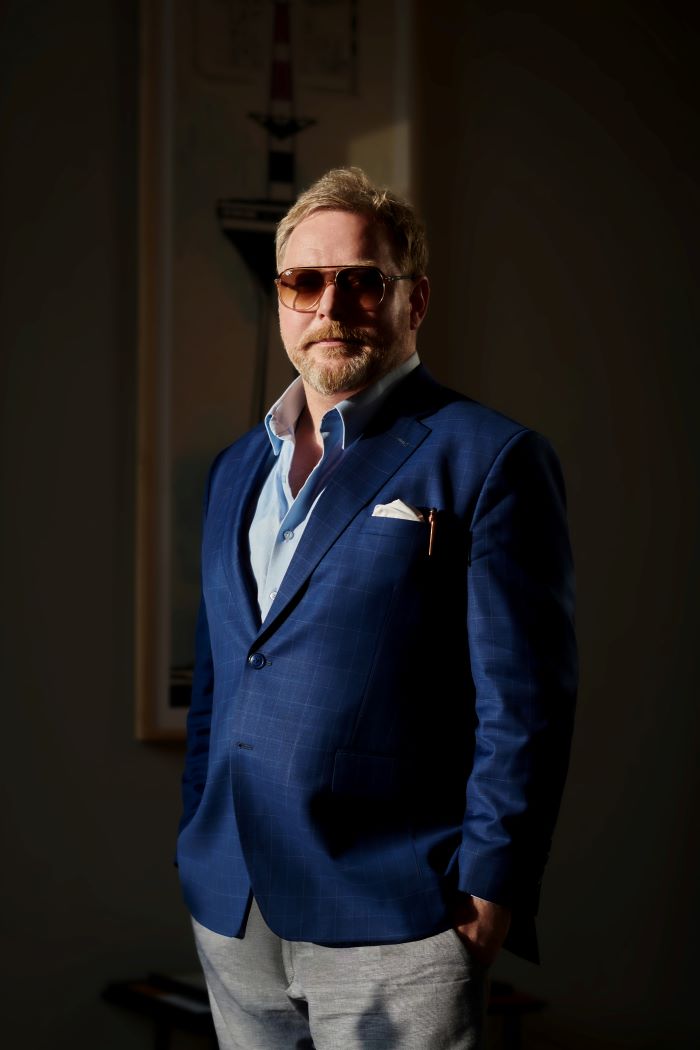
Oh, by the way, do you know what they have called me at the GUM market? “Red sun”! I don’t know why, - laughs Kristian.
-Well, you do come across like a very sunny, optimistic and a positive person. Is this your nature?
-Yes, it is for sure and I am also a dreamer. Well, having created a “Dining Impossible” you have to be a dreamer. But you also have to be a practical man and have a good amount of stamina to pull it through because it was not easy in the beginning.
-Why did you decide to make these dinners? You were a sommelier, a restaurateur and one day you decided to change your life?
-I think it was 2009 when the world went through a financial crisis. I was in San Fransisco to open a big restaurant and a nightclub with partners but our budget of eight million dollars was gone. So, I went back to Copenhagen, where I mainly lived, only to realize that everything was jolly good there. Nobody really had a crisis. It turned out that people being cautious kept cash at home. This did stagnate the economy though: people need to spend. So, I thought - why not to be a humble light in darkness? Let’s make some ‘bon vivant’ things, lay tables, make people meet each other, and perhaps do business together. I hosted a series of dinners which were like a networking in the beginning and they were a success.
-How then did local Danish networking parties transcend into alluring dinner extravaganzas of a global magnitude?
-At that point Noma became number one restaurant in the world. Imagine, they had around 2 million requests a year for 22 thousand seats! Only a small percentage of people could get in. So, I spoke to René Redzepi - “Look, - I said, - you have this room upstairs that you never use, why shouldn’t I just host dinner parties there?”. So, I did. And all of a sudden, my dinner parties for local business leaders and medium-size companies turned into dinners for international sport stars, counts, owners of giant liquor factories in Columbia, British spies, famous actors… All of a sudden, I had the best guest list in Europe! And things took off from there…
-Why did you call them Dinner Impossible?
-In 2016 when I went from one-night to three-night dinners at Geranium and Noma, people were telling me: “Kristian you won’t get so many guests. It’s impossible!” Ok, - I thought, - let it be the ‘Mission Impossible’ of dining experiences. Remember that movie with Tom Cruise? Well, it worked. I have now done thirty-two Dinner Impossible parties – in Chicago, New York, Lima, Mexico, Hong Kong, you name it… But then I had a bigger plan. You won’t believe it!
-Tell me all as I expect nothing less than terrific!
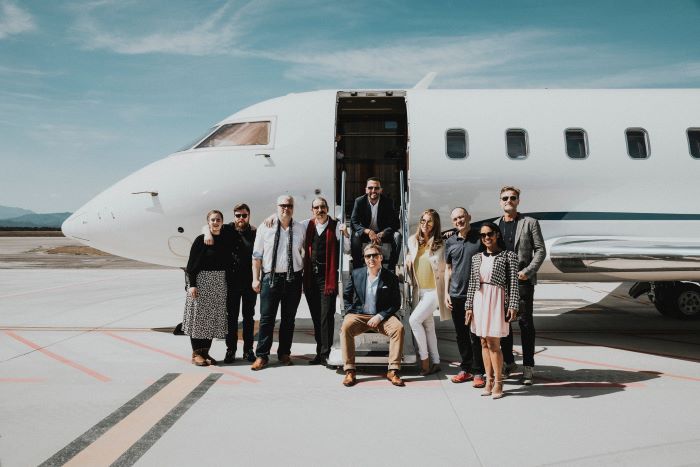
- When you do something interesting, people tend to copy it. I knew they were not going to do it as well as we do but I felt a need to take it to the next level so I created something called DI:JET – a private jet edition when we fly between four different countries in four days for dining. Once we ended up in Monte Carlo and danced at the casino tables. It’s a lot to consume in four days - people feel like they are a rock band in the film.
- It sounds tremendously luxurious.
-It is extremely luxurious but it’s not for luxury that I am doing it but to see how far I can take it in the pursuit of perfection. Like a craftsman, like a man who cuts the bonsai tree… I am a professional dinner party host and I want to see how perfect I can make it in the sense of having the best of the best all the way through the experience.
- What makes dinner party magical? Apart from outstanding food, of course.
-It’s about sharing, I would say. OK, when a dinner begins it’s all about the food and wine, flavors and your hunger to be satisfied but then, the more you get into a dinner party, and mine can last up to six hours, then it’s more the spirit that comes into play and it becomes more about sharing the moments that you are having together: you create friendships, businesses and even love sometime and it’s an honorable task to host such dinners.
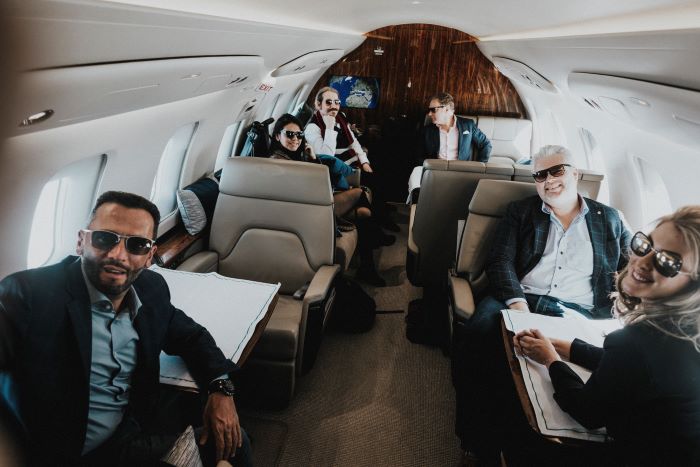
We built a lot of experiences around them. In Armenia there were helicopters; In the Faroe Islands we served caviar while sailing on a vintage schooner into a cave concert on the water; in Peru we took guests far into the Pacific Ocean for drinks; in Paris - at the top of the Eiffel tower; in Rome – on a balcony overlooking the city. It’s really about such moments of beauty…
- Considering your vast experience, is it still possible to surprise you?
- Good question. Yes, it is. I went to New Zealand a month ago and met this crazy, wonderful Vaughan Mabee - he grows his own abalone, and he kills the beast, as he calls it - a big deer or a large wild boar once every second week to serve his quests. It’s very brutal but very honest and super delicious. You feel you are in a scene of The Game of Thrones when you eat his food.
- Taking of surprises, which country do you think would be next to va-va-voom the world with its cuisine?
- The world doesn’t see it’s coming, but it is - New Zealand! Something unbelievable is happening down there - very original and very provocative.
- What about Armenia? Do you think we can secure our place on the word’s gastro-map and attract culinary tourists? Do our chefs have the potential to be international players?
- You have a big potential. The very idea of The Armenian Quest project that we have with the DAR Foundation’s Gagarin Project is to bring the world to Armenia and Armenia out to the world. Therefore, we try to find new branches in the stem of the Armenian culinary language because I think Armenia, like Georgia, is a little bit trapped in a pattern when you serve the same ten-twelve dishes and use the same twenty odd ingredients. But you have eighty let’s say. So many things are still unexplored. Mads stayed in Armenia for a month; he went into nature, to markets, to Matenadaran… He really researched things based on my initial research and then he created sixteen new dishes with your products that you had never thought about. These dishes became an inspiration for your chefs to also experiment in their kitchens. Now we want to bring in Diego to keep on exploring.
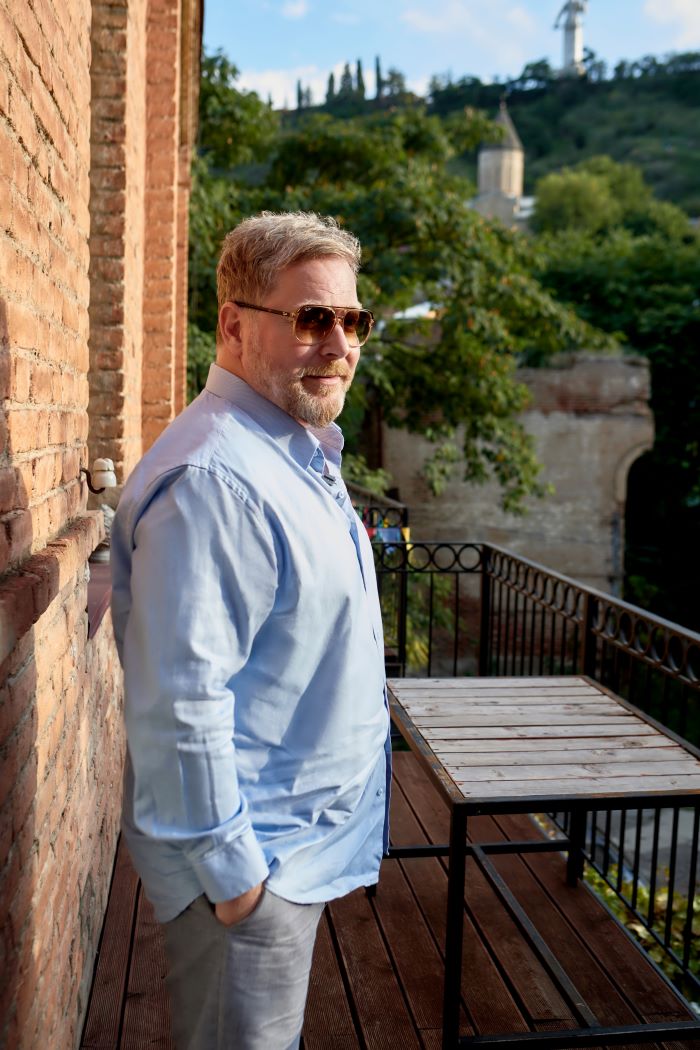
- Experiments are often seen as risky for restaurateurs, as they face a harsh dilemma – to experiment risking their profit or play safe catering to the taste of their audience. Let’s admit it, Armenians tend to be conservative in their taste. It’s not easy to change.
-There is nothing wrong about being conservative. But it also means that you renew yourself with all respect to traditions. Do you remember the kebab from ducks’ feet sticking out from pumpkin that Mads served at Tsaghkunk? There were so many “no way”, “it’s a little bit too barbaric”, “guests will not like it, they will leave” … Well, tough job - we have to do it! We have to try and get you out of conservative, traditional patterns. And, see, people ended up loving it.
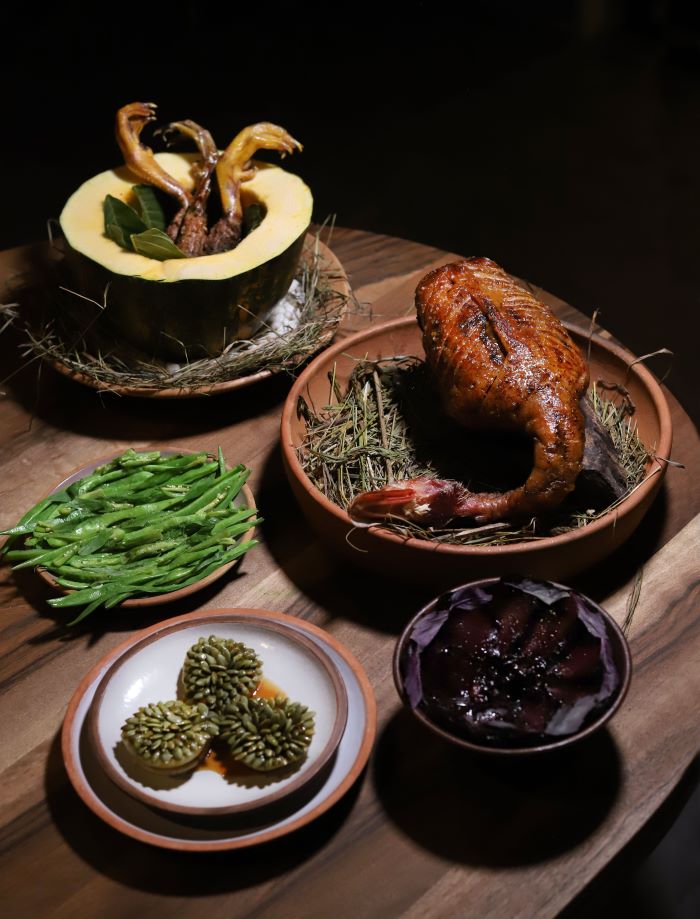
-You come from outside yet, you know us well enough having spent a chunk of time in Armenia. I wonder about your impression of our strongest and weakest sides, as you observed them?
-Oh, can I be honest? - Kristian laughs.
-Yes, please!
-Well, your strongest side is your resilience and your perseverance and the fact that you do things despite having your backs against the wall as I see it. I have met some of the most talented chefs in the world but who had things coming too easy for them and they became sloppy, they became too used to having everything at their disposal. And I met others who were not as talented but who had great willpower and succeeded not necessarily in the beginning but in a long run. The best wines are those who have had to fight their way through a poor soil. They really get muscles to get all the way down to the nectar in the ground and become strong wines. So that’s your biggest strength.
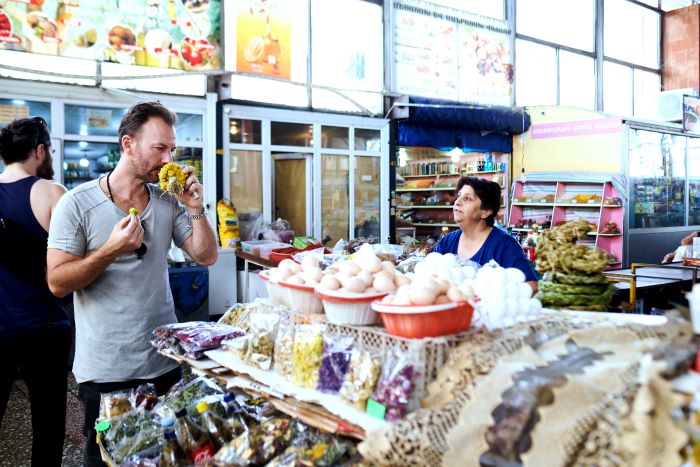
Your biggest weakness I would say is that sometimes one hand doesn’t know what the other is doing. As for gastronomy, your big weakness is the lack of significant culinary schools. You need an educational system to create a basis. Oh, and communications… A lot of people in the culinary field who are really good don’t understand a word of English. But it‘s a key to becoming recognized worldwide: a chef should communicate to the international press. What if I put an Armenian chef on the stage in Paris? How will she or he present?
- Education, language skills… There must be a third “whale”?
- Invest in your chefs - get them out of Armenia. They need to go and learn elsewhere for two-three years and then come back. Why is Nordic success as big as it is? Because a great talent pool we had in 90s and 00s educated by the old masters of Denmark instead of just staying at home, travelled out - France Spain, US…They worked in the world’s best restaurants and then brought that knowledge back to Denmark. So, get out, come back and develop.
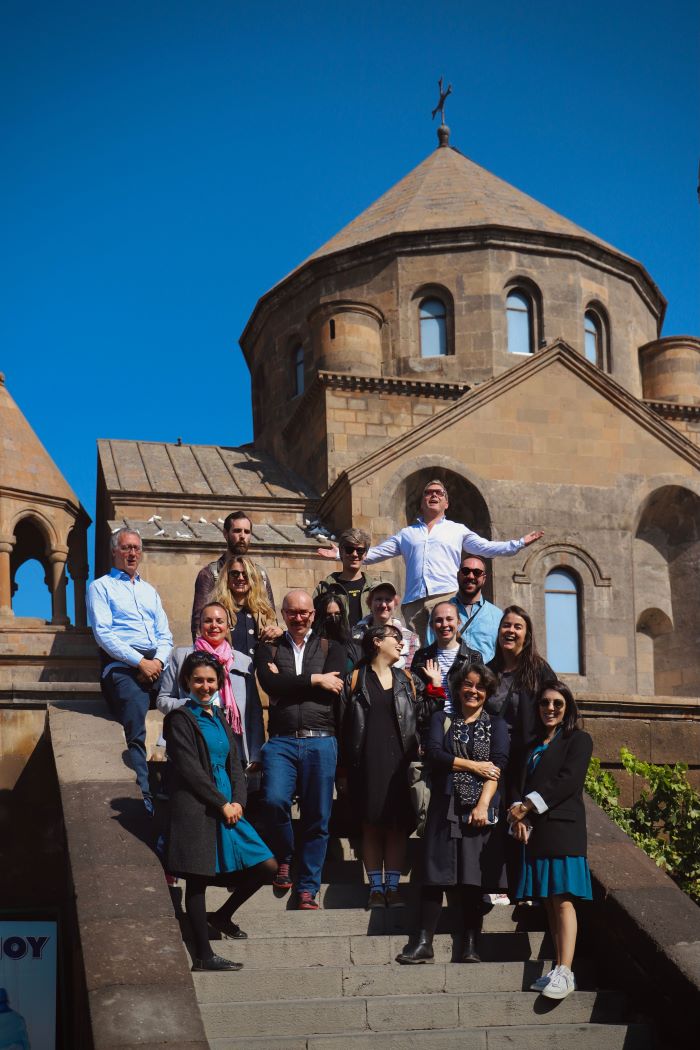
- Did you always know your path? Was it straightforward?
-No, I was a little bit confused. Would you believe it - I was a professional hip-hop dancer touring with a band? When I was done with that, I was nineteen or so, I didn’t know what to do with my life, I was lost. Then I took a part-time job as a waiter and before I knew it, I was offered an apprenticeship. It takes 3.5 years to become a waiter in a Danish culinary school. It’s not just “I’m gonna take the plates from the kitchen to the table”. It’s a proper education - you are trained in etiquette, languages, gastronomy, wines. After those 3.5 years you are an educated gentlemen and if you use your knowledge well, you can go in all different directions. That is what happened to me.
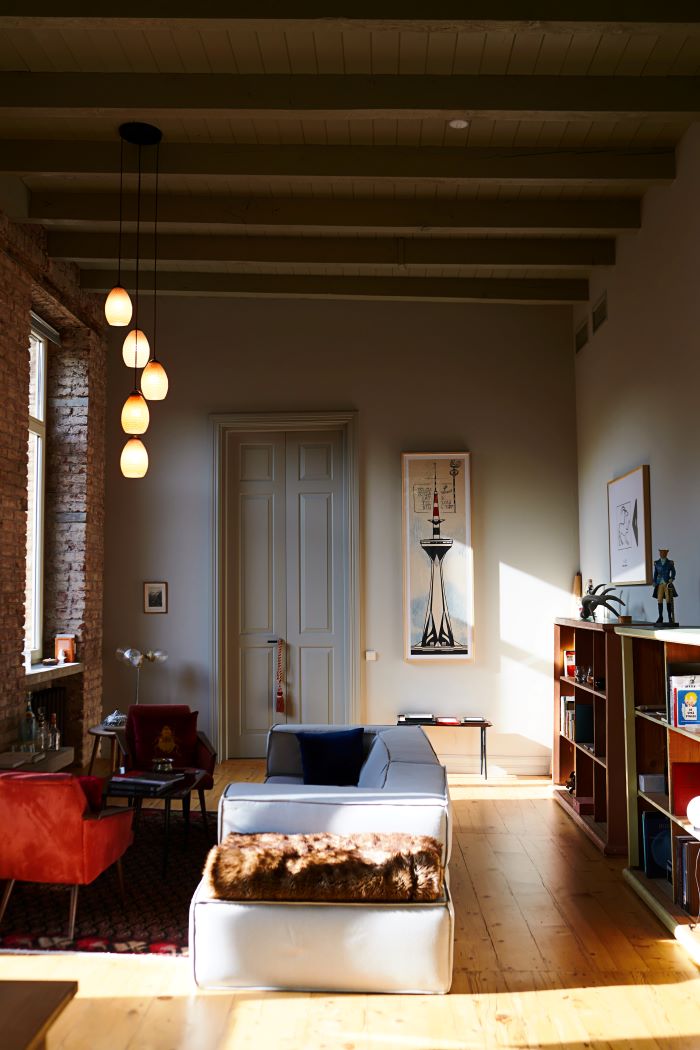
- So how did your path bring you to Tbilisi?
- It’s my second adopted city now and the reason I am here is because my daughter Katerina was born here this January. I met her mother in Yerevan by the way. At some point, at the age of two or three, Katerina will start to remember everything and I need to be here for her.
-Representing nineteen best restaurants in the world, producing films (“Michelin Stars – Tales from the kitchen” to name one), organizing tours of star chefs and dinners all around the globe… Now you are also a father… How on Earth do you have time for all of that?
- I have no idea. Seems I have a work capacity for three. It must be because I was educated and worked at the top restaurants that were understaffed. Staff is expensive in countries like in the North because taxes are so high. When you work in such restaurants where everything goes very fast you really learn to think four steps ahead and be efficient. You learn how to make yourselves and your stuff the best versions of themselves.
- Well, my impression of you is that you have almost this inbuilt gift – to think way into the future, foresee it and grab the Zeitgeist. I wonder what you consider as your main talent?
-Oh, I have so many, - Kristian laughs. – Dasha (he refers to Daryna Yefremova, a culinary liaison at Bon Vivant Communications who is enjoying her tea in another part of the room), - can you help me – what is my main talent?
- To gather people around who he enjoys working with and who enjoy working with him, - says Dasha. His talent is to make magical things happen.
-So, you are a magician, Kristian?!
-I am a dreamer. I basically live in my own film that I create all the time… I am a creator, therefore I am…
Nata Brettell
Follow NEWS.am STYLE on Facebook, Twitter and Instagram
- Wine Story: Wine trends 2024 - what will wine lovers drink? In 2024, we see an interesting picture: people increasingly prefer simplicity, minimalism, and accessibility in wine. This trend is becoming pronounced both in the choice of wine styles and in the preferences of winemakers around the world. What changes does this focus bring to the world of winemaking and which wines will be most in demand in this context...
- Franck Muller, S.T. Dupont introduce Master Lighter Franck Muller and S.T. Dupont have introduced the Master Lighter. The model combines the craftsmanship of both brands, fusing watchmaking with luxury lifestyle accessories to create something surprisingly chic and functional...
- Dubai's 120 richest families and individuals are worth $1 trillion Dubai is home to more than 120 of the world's wealthiest families and individuals, with a combined wealth of more than $1 trillion, as the UAE has attracted thousands of millionaires from around the world over the past decade, especially since the pandemic...
- Gold pocket watch found on Titanic's richest passenger sells for record $1.46M The pocket watch that belonged to the richest passenger aboard the Titanic has sold at auction in England for $1.46 million, breaking the record for an item associated with the 1912 disaster...
- KFC to introduce perfume Kentucky Fried Chicken (KFC) has set its sights on the fragrance business with the introduction of a charcoal and smoked wood fragrance...
-
19:19, May 1
Wine Story: Wine trends 2024 - what will wine lovers drink? -
16:12, May 1
Franck Muller, S.T. Dupont introduce Master Lighter -
15:27, May 1
Irina Shayk strips off for Marc Jacobs advertising campaign -
13:16, May 1
Tom Cruise is “flattered” that Irina Shayk is interested in him, but this mission is impossible -
11:57, May 1
Dita Von Teese proves that time has no power over her -
11:10, May 1
Elizabeth Hurley shows off her age-defying figure -
10:13, May 1
Kim Kardashian in new unusual image -
22:22, April 30
Al Capone's pistol up for auction, with starting price of $500,000 -
20:31, April 30
Victoria Beckham x Mango: Cool, casual, chic -
19:17, April 30
Dubai's 120 richest families and individuals are worth $1 trillion -
16:23, April 30
Gold pocket watch found on Titanic's richest passenger sells for record $1.46M -
15:40, April 30
KFC to introduce perfume
All materials
- Archive
























